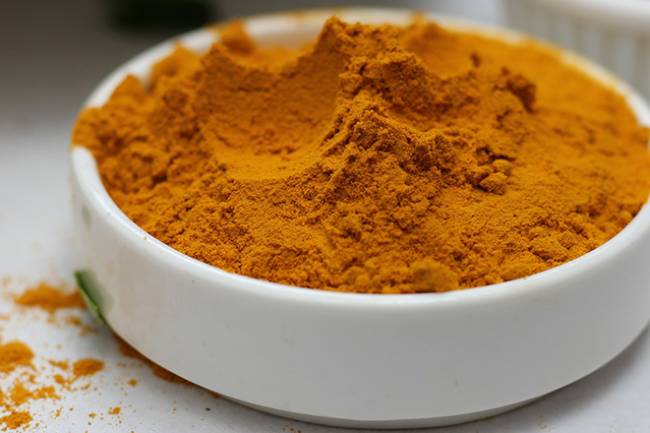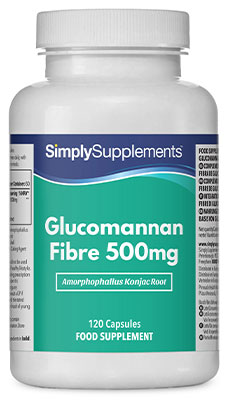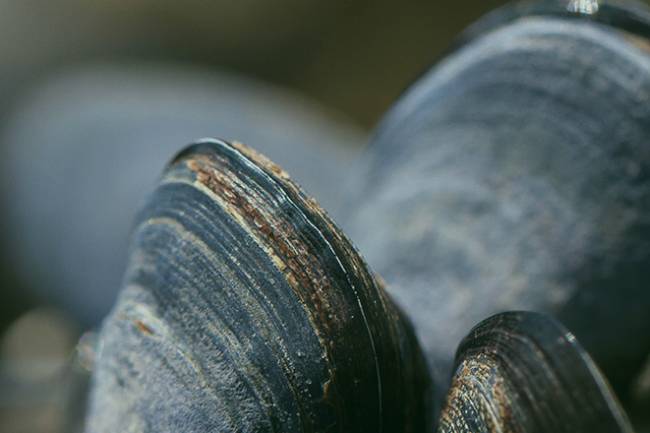Health Benefits of Glucomannan (Konjac Fibre)

Nutritionists have long known that dietary fibre offers a range of health benefits. However, not all forms of fibre are identical. Glucomannan is one source of fibre that has grown significantly in popularity recently, and for good reason as we will see.
While glucomannan has been consumed in traditional dishes for generations, scientists have only just started to realise the astonishing properties of this nutrient and the many ways in which it may positively impact the body.
What is Glucomannan?
Glucomannan is a source of fibre taken from the root of the Konjac plant (Latin name Amorphophallus konjac). It has been found that up to 40% of the weight of the Konjac root consists of this impressive polysaccharide.
Konjac is also sometimes known as the “elephant yam”. It belongs to a group of 170 closely-related plants, though Konjac is currently thought to be the only member from which glucomannan is harvested. Native to Southeast Asia, it has a long history of culinary use and is a key ingredient in Japanese shirataki noodles.
Glucomannan is not just any ordinary source of fibre, and there are a number of properties that have contributed to its rise in popularity. Glucomannan is a soluble fibre, which means that it absorbs water and turns it into a rich gel when in the gut.
The efficiency with which glucomannan absorbs water is shocking. Studies suggest that it can absorb up to 105 grams of water per gram of Konjac. So powerful is this property that it is possible to drop a small spoonful of glucomannan into a glass of water and watch it turn into a gel before your eyes. It should hardly be surprising that glucomannan is therefore considered the most viscous source of fibre currently known to man.
This process of absorbing large quantities of water is important because this is what seems to give glucomannan its beneficial properties. Most notably, it swells up in the digestive system. While this might not sound like a particularly impressive claim to fame, it has a significant impact on how full one feels after eating, what nutrients are absorbed and how rapidly food moves through the digestive system.
This, in turn, can positively impact a number of different health conditions, the most famous of which is the support that it lends to healthy weight loss...
Glucomannan for Weight Loss
 It is no secret that being overweight can be bad for your health. High levels of body fat are linked to a range of unpleasant conditions from heart disease to some cancers. At the same time, many people believe that we are programmed to retain excess calories in case of lean times ahead. No wonder that losing weight is so difficult for much of the population, despite the importance of doing so.
It is no secret that being overweight can be bad for your health. High levels of body fat are linked to a range of unpleasant conditions from heart disease to some cancers. At the same time, many people believe that we are programmed to retain excess calories in case of lean times ahead. No wonder that losing weight is so difficult for much of the population, despite the importance of doing so.
Glucomannan is intriguing because evidence suggests that it may help in this regard. Indeed, according to the European Food Safety Authority (EFSA) “glucomannan in the context of an energy restricted diet contributes to weight loss”.
One placebo-controlled trial involved 176 healthy overweight participants who were split into four different groups; participants in group one were given a daily glucomannan supplement, while those in group two received glucomannan with guar gum; those in group three received glucomannan with guar gum and alginate and those in group four received a daily placebo. All participants followed a 1200 calorie controlled diet for 5 weeks.
Findings showed that all three glucomannan groups had significant weight loss compared to placebo or diet groups. However there was little statistical difference between the three – participants in all three glucomannan groups lost approximately 0.8 kg (1.8 lbs) per week.
A separate 2007 study published in the British Journal of Nutrition involved participants taking a combination of glucomannan and psyllium husk (another dietary fibre). Findings showed that the fibre group lost an average of 10 lbs over 16 weeks compared to 1.7 lbs in the placebo group.
On a much smaller scale, a trial involving 20 overweight women who were given 1 g of glucomannan 3 times daily for 8 weeks, found that they lost an average of 5.5 lbs, compared to 1.5 lbs in the placebo group.
In one final study a group of overweight individuals were split into two groups. The first of these was provided with a glucomannan supplement. This was taken with 50ml of water 5-10 minutes before each meal for a period of 14 weeks. The second control group continued on as normal. Thereafter measurements were taken. The group supplementing with glucomannan fibre experienced an average weight loss of almost 6kg during that period and a reduction in waist size of 12cm, while body fat levels fell by an average of 2.43%.
Interestingly, the scientists also observed that the participants saw significant declines in cholesterol levels, hinting at a further benefit of glucomannan supplementation.
How Does Glucomannan Support Healthy Weight Loss?
So how does glucomannan support healthy weight loss when used in conjunction with a calorie-controlled diet?
It is believed that this occurs in a number of manners. Firstly, the way that glucomannan absorbs water and turns into a paste means that it can make us feel fuller when consumed a short while before eating. This is bolstered by the fact that glucomannan contains very little in the way of calories, further helping to restrict the intake of energy.
This gel-like structure also delays emptying of the stomach, helping us to feel fuller for longer when compared to a standard diet.
There is also some evidence to suggest that like other soluble sources of fibre it reduces the absorption of proteins and fats, which may further have an impact to overall calorie intake, especially when combined with an energy restricted diet.
Glucomannan for Cholesterol
The manner in which glucomannan slows down the passage of food also has an impact on how quickly the nutrients pass across the gut wall and into the body. It is for this reason that EFSA have authorised the claim that glucomannan contributes to the maintenance of normal blood cholesterol levels.
One placebo-controlled trial involved 63 healthy men, who were each given 3.9 grams of glucomannan or a placebo daily for 4 weeks. This was followed by a 2 week wash-out period, followed by another 4 weeks of treatment. Findings showed that glucomannan reduced total cholesterol by 10% and LDL (bad) cholesterol by 7.2%, compared to the placebo group.
Interestingly, another study followed a similar pattern but noted that the beneficial impacts on cholesterol levels were particularly noticeable in female participants when compared to males. They found that total cholesterol in their study group fell by 24% in females over the course of 8 weeks but only by a still-impressive 9% in males. LDL cholesterol levels also fell by 30% in female participants when compared to 9% in males.
It is thought that this effect on cholesterol levels comes in response to two different factors. Firstly, glucomannan’s viscous nature slows down the rate at which nutrients are absorbed from the gut. This, in turn, seems to impact the rate at which cholesterol is absorbed from food.
Just as importantly, however, studies suggest that larger volumes of cholesterol are actually excreted when individuals supplement with glucomannan. One such analysis found that Konjac glucomannan “improved blood lipid levels by enhancing fecal excretion”.
Glucomannan for Diabetes
Type 2 diabetes is a growing problem in western nations, yet is a preventable disease in most cases. It is believed by experts that problems arise in response to sudden spikes in glucose, typically from the consumption of sugary foods and drinks. When these spikes of blood glucose occur repeatedly, the body can start to become resistant to the effects of insulin.
One study gave 1 gram of glucomannan to diabetics half an hour before they consumed a high dosage of glucose. Thereafter changes in their blood sugar levels were monitored, in order to assess the impact of glucomannan.
The experts found that participants taking the supplement experienced significantly smaller spikes in blood sugar levels when compared to non-supplementing volunteers. Furthermore it was found that this “protective” benefit was experienced for at least two hours after food consumption.
Even more impressively, the results demonstrated that female participants saw measurable reductions in insulin resistance, though this was not observed in the male volunteers. They concluded that “glucomannan ingestion attenuated a rise of blood glucose without significantly affecting insulin levels”.
It seems, therefore, that glucomannan slows down the rates at which the stomach empties and nutrients move into the body. This, in turn, reduces significant fluctuations in blood glucose levels, leading to improvements in the conditions that may otherwise lead to the onset of diabetes.
Glucomannan for Constipation
 Dietary fibre is known to be beneficial for the smooth passing of food through the digestive tract. Here glucomannan once again seems to come into its own. Thanks to the gel-like texture of glucomannan when it absorbs water in the gut, any food present is able to move smoothly and efficiently. To this end it seems that suitable supplementation with glucomannan may help to increase regularity and to improve symptoms of constipation.
Dietary fibre is known to be beneficial for the smooth passing of food through the digestive tract. Here glucomannan once again seems to come into its own. Thanks to the gel-like texture of glucomannan when it absorbs water in the gut, any food present is able to move smoothly and efficiently. To this end it seems that suitable supplementation with glucomannan may help to increase regularity and to improve symptoms of constipation.
In one study, volunteers received either 4.5g of glucomannan per day (split into three 1.5g doses) or an identical-looking placebo. Thereafter the passage of food was measured in order to observe the effect of the fibre. The results show that stool frequency increased by 27%, whilst volume also increased by as much as 30%.
The same study also found that individuals taking the supplement experienced significant growth in the colonies of “friendly bacteria” that reside within the digestive tract, highlighting another potential benefit of Konjac.
How Much Glucomannan Should I Take?
You should aim to consume around 30 to 50 grams of fibre on a daily basis, which ideally should be a mix of soluble and insoluble fibres. Glucomannan can be taken in tablet or powder form, both of which are almost tasteless and great for adding to food or smoothies. However, it is best to take glucomannan 15 to 30 minutes before a meal to give the gel time to expand and partially fill the stomach:
For weight loss: Take 1 gram, 3 times per day (1 gram before each meal)
For high cholesterol levels: Take 1 gram, 4 times per day (split between meals)
Dosages up to 4 grams per day have been clinically tested and are well tolerated, but, as with all fibre supplements, start on a lower dose around 1000mg and build up to your desired dosage.
It is important to reiterate the ability of glucomannan to absorb moisture, and to swell significantly as it does so. It is therefore important to ensure that glucomannan is washed down with at least one glass of water; otherwise it may fail to offer the same health benefits or could start to expand before it reaches the stomach.
Side Effects & Interactions of Glucomannan
Glucomannan is a natural ingredient that typically contains no additives or chemicals. It is extremely well tolerated and is generally considered safe when taken within the recommended guidelines.
When you increase your fibre intake start slowly and build up to the maximum dosage, otherwise you may experience bloating, flatulence or soft stools for a few days while the body adjusts. While these symptoms are fairly common for the first few days, if they persist, stop taking glucomannan and consult with a medical professional.
If you are currently taking any medications, you are advised to take them 1 hour before or 2 hours after taking glucomannan because it may reduce the speed at which they are absorbed into the bloodstream.

Sources:
http://jn.nutrition.org/content/130/11/2753.short
http://ajcn.nutrition.org/content/88/4/1167.short
http://ajcn.nutrition.org/content/61/3/585.short
http://www.sciencedirect.com/science/article/pii/S016745010080014X
http://www.sciencedirect.com/science/article/pii/S0939475305000384
https://www.ncbi.nlm.nih.gov/pubmed/14983741
https://www.researchgate.net/profile/Supornpim_Chearskul/publication/5807267_Glycemic_and_lipid_responses_to_glucomannan_in_Thais_with_type_2_diabetes_mellitus/links/54e2a2190cf2edaea0934845.pdf
http://www.sciencedirect.com/science/article/pii/S0899900706003133
http://www.sciencedirect.com/science/article/pii/S0378874110000383
http://pubs.acs.org/doi/abs/10.1021/bm010014c

 Nicole
Nicole 

























